
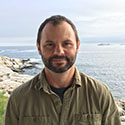
Associate Professor, Temple University
Dr. Cordes is an Associate Professor and Vice Chair of the Department of Biology at Temple University. He received his Master’s degree from Moss Landing Marine Labs on Monterey Bay, his Ph.D. from Penn State University and was a post-doctoral fellow at Harvard University. He has worked on the ecology of the deep sea for over 20 years, spending over a year at sea on 29 research cruises and making 40 dives in manned submersibles. His work is centered around the ability of organisms to shape their environment and increase biodiversity, but has increasingly become focused on the impacts of humans in the deep sea. Dr. Cordes is among the Pool of Experts for the ongoing UN World Ocean Assessment, the Chair of the Oil & Gas Working Group of the Deep Ocean Stewardship Initiative, and on the Board of Directors for a non-profit conference center in New Hampshire. Some of his recent work can be found here: https://sites.temple.edu/cordeslab/ .
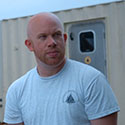
Research Assistant Professor, Temple University
Visiting Faculty Member, Haverford College
Dr. Jay Lunden is a research assistant professor at Temple University as well as a visiting faculty member of the Biology Department at Haverford College. He received his PhD from Temple University and was a postdoctoral researcher at UC Santa Barbara and the University of Maine. Jay is broadly interested in understanding the impacts of climate change on deep-sea corals at the cellular and organismal levels; his PhD work explored the effects of ocean acidification on Lophelia in the Gulf of Mexico and his postdoctoral research brought him to the Southern Ocean to study the impacts of ocean warming on larval development and cellular necrosis on Antarctic deep-sea corals. On the DEEP SEARCH project, Jay is working with Erik’s lab to describe the oceanographic conditions of the coral habitats in the study area, particularly temperature, oxygen, and pH, as well as physical data obtained from the long-term benthic lander deployments.
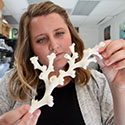
PhD Candidate, Temple University
Alexis is a PhD candidate in Dr. Erik Cordes’ lab at Temple University. Much of her research involves understanding how humans are influencing deep-sea coral communities. To better understand this, she is conducting multiple-stressor experiments exposing Lophelia pertusa colonies to various levels of pH, temperature, and oil-dispersant mixtures. Assessments of coral health are recorded during and after exposures by examining both the physiological and transcriptomic response. Before starting her PhD at Temple University, Alexis completed a M.Sc. in Ecology, Evolution, and Conservation Biology at San Francisco State University and the California Academy of Sciences. Her first experience with marine research was at Florida Institute of Technology, where she earned a B.Sc. in Biological Oceanography. During this cruise, she will primarily be involved with collecting and maintaining live corals which will be transported back to Temple University for future experiments.
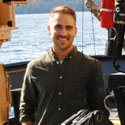
PhD Student, Temple University
Ryan Gasbarro graduated from Arizona State University with a degree in Environmental Science & Biology. After receiving his bachelor's degree, he received his Master of Science degree in Earth & Ocean Sciences at the University of Victoria in British Columbia, Canada working in Verena Tunnicliffe's benthic ecology lab. His M.Sc. research focused on describing suspension feeding communities in one British Columbian fjord and detailing the disassembly of a benthic community by low-oxygen stress in another fjord. After receiving his Master's, Ryan did some work in a hydrothermal vent system mapping biogenic habitat and selecting suitable areas for potential deep-sea camera deployments. Ryan will be pursuing a PhD in Biology at Temple University in Dr. Erik Cordes' lab beginning in Fall 2018 working on the submarine canyon and coral communities we image during DEEP SEARCH. This will be the first cruise for his PhD and his first time offshore. He is very excited to have the opportunity to explore these deep-sea habitats that are new to science!
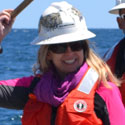
Research Benthic Ecologist, U.S. Geological Survey
Dr. Amanda Demopoulos is a Research Benthic Ecologist for the U.S. Geological Survey (USGS) at the Wetland and Aquatic Research Center in Gainesville, Florida. She received a B.S.in Oceanography from the University of Washington, and M.S. and Ph.D. in Biological Oceanography from the University of Hawaii at Manoa. After completing a post-doctoral fellowship at Scripps Institution of Oceanography, she obtained her current position at USGS, where she conducts research on the community ecology of coastal wetlands, shallow and deep-sea coral reefs, and seeps. She has been conducting benthic ecological studies for over 20 years, examining the community structure and function of animals found in sediments, or infaunal benthos, and characterizing energy flow (food) through different environments. To date, she has participated in 34 offshore expeditions, and dived in submersibles 11 times, plus worked with several other deep-sea ROVs and AUVs. For this project, she serves as the project chief for the USGS team scientists, helping coordinate the USGS research with the TDI Brooks team, BOEM, and NOAA. Her specific research will focus on examining the community ecology and food webs within and among seeps, corals, and canyon environments. For this expedition, she will be collecting sediments using the Alvin (push cores) and from the ship (multicore and monocore) to characterize the infaunal communities. She will also be dissecting tissue samples and filtering water for stable isotope analysis to identify food-web linkages and energy transfer in these deep-sea environments.
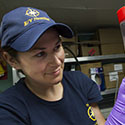
Biologist, U.S. Geological Survey
Jennifer McClain-Counts is a biologist at U.S. Geological Survey’s Wetland and Aquatic Research Center in Gainesville, FL. Jennie received her B.S. degree in Marine Biology (2006) and her M.S. degree in Marine Science (2010) from the University of North Carolina Wilmington. She is interested in the use of stable isotopes to elicit trophic relationships and currently works with Dr. Amanda Demopoulos (USGS - WARC) to examine trophic and community structure of marine fauna collected in various habitats, such as wetlands, offshore wrecks, deep-sea coral, chemosynthetic communities and submarine canyons. During the cruise, Jennie will assist with processing sediment cores, water samples and trawl samples. This will be Jennie's 20th offshore cruise and she is looking forward to exploring some new sites and reliving her graduate days using a midwater trawl.

Research Technician, U.S. Geological Survey
Jonathan Quigley graduated with a B.S. in Journalism from the University of Florida and works as a research technician in the Benthic Ecology lab at the U.S. Geological Survey (USGS) Wetland and Aquatic Research Center in Gainesville, Florida. He is currently changing careers from database development and web programming to pursue marine sciences. This will be his first cruise, and he is ecstatic for the opportunity to learn more about the field research process.
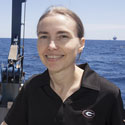
Professor, University of Georgia
Samantha Joye is an educator, a deep ocean explorer, and an ocean and environmental advocate. She holds the Athletic Association Distinguished Professorship in Arts and Sciences and is a Professor in the Department of Marine Sciences at the University of Georgia. She is an expert in oceanography, environmental microbiology, and geochemistry. Her interdisciplinary research focuses on deep ocean extreme environments and tracks the fate of hydrocarbons, nutrients, sulfur, metals, and trace gas dynamics. She has studied ecosystem impacts of natural seepage of oil and gas in the Gulf of Mexico, the Arctic, the Gulf of California, and elsewhere for over 20 years. She currently leads the ECOGIG (Ecosystem Impacts of Oil and Gas Inputs to the Gulf ) research consortium. Following the 2010 Deepwater Horizon oil spill, Joye examined the distribution of deepwater plumes of oil and gas and the distribution of sedimented oil along the seabed. Her group continues to measure the activities of the microorganisms that break down hydrocarbons and to assess the impacts of the incident on blue water benthic and pelagic ecosystems. Joye earned her Ph.D. in Marine Sciences from the University of North Carolina-Chapel Hill in 1993 and joined the faculty of the University of Georgia in 1997, having served briefly as an assistant professor of oceanography at Texas A&M. She was awarded a fellowship at the Hanse Institute for Advanced Study in Delmenhorst, Germany, where she served as a visiting professor at the Max Planck Institute for Marine Microbiology in Bremen, in 2002-03.
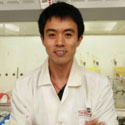
Postdoctoral Research Associate, University of Georgia
Dr. Guangchao Zhuang is a biogeochemist from Dr. Mandy Joye’s lab, University of Georgia, Athens. He received a Ph.D. in Organic Geochemistry from University of Bremen (Germany; 2014). He is broadly interested in the interactions between microbial life and the element cycle (e.g., C, N, S) in marine environment. His work typically integrates geochemical, microbiological, and rate analyses with stable and radioactive tracer techniques to examine microbiological processes in a variety of marine environments, including the open ocean, estuarine sediments, deep subseafloor biosphere, cold seeps, gas hydrate, hypersaline and hydrothermal ecosystems.
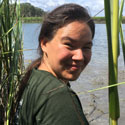
PhD Student, University of Georgia
Hannah Choi is a graduate student at the University of Georgia. She received her B.A. in biology from Reed College, where she spent her time studying symbiotic nitrogen fixation in cycads and facilitating student research projects at the college’s TRIGA Mark I nuclear reactor. She became interested in oceanography while working as a deckhand with the Los Angeles Maritime Institute. Aboard their 100 foot brigantine, the Irving Johnson, she explored the Channel Islands and taught middle and high school students how to sail. Now, she is beginning her third year in the Joye group at the University of Georgia, where she works on pelagic methanotrophy in the Gulf of Mexico and the Gulf of California. On this cruise, she is excited to bring this work to the bubble plumes of the Atlantic.

Research Technician, University of Georgia
Lauren Carroll is a researcher in the Molecular and Biogeochemistry Labs for the Joye Research Group at The University of Georgia. During this project, her work will be focused on the collection, processing, and analysis of various gas, sediment and water samples via CTD operations. She holds a Bachelors Degree from The Odum School of Ecology at The University of Georgia and plans to pursue a Graduate Degree in Coastal Mapping.
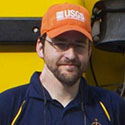
Research Geologist, U.S. Geological Survey
Dr. Jason Chaytor is a research geologist with the U.S. Geological Survey at the USGS Woods Hole Coastal and Marine Science Center. Jason graduated from Queensland University of Technology (Brisbane, Australia) in 2000 with a first-class honours degree in Geology, completed his Ph.D. in Geological Oceanography at Oregon State University in 2006, and was a postdoctoral scholar at Woods Hole Oceanographic Institution between 2006 and 2009. Jason conducts research on issues related to marine geohazards including submarine landslides, tsunamis, earthquakes, and plate tectonics and shallow- and deep-water sedimentary processes on Atlantic, Gulf of Mexico and Pacific margins of the U.S. and in the northeast Caribbean. He is the current principal scientist for the USGS Woods Hole Coastal and Marine Science Center Sediments Laboratory.
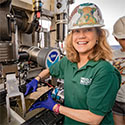
Research Geneticist, U.S. Geological Survey
Dr. Cheryl Morrison is a Research Geneticist at the U.S. Geological Survey (USGS) Leetown Science Center in Kearneysville, West Virginia. She received a B.S. in Marine Biology from the University of North Carolina at Wilmington (1991), and a PhD from Florida State University in Biological Sciences (1997). Cheryl is interested in marine biodiversity and how diversity is generated and maintained through life history traits and the physical oceanographic conditions that organisms experience. She has been studying cold water coral ecosystems for over a decade in the Gulf of Mexico, Atlantic and Pacific Oceans, and has participated in 25 research cruises using submersibles and ROVs to explore and characterize benthic habitats. Her current research involves the utilization of genetic and genomic techniques to aid in the study of biodiversity, population and community structure at vulnerable deep-sea habitats (deep-sea corals, cold seeps and canyons). During the mission, Cheryl will take tissue samples that will be utilized back in the laboratory for DNA barcoding to aid in species identification as well as connectivity studies for select, abundant corals.
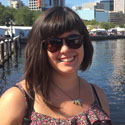
Web Coordinator, NOAA Office of Ocean Exploration and Research
Caitlin Adams is an operations coordinator with NOAA’s Office of Ocean Exploration and Research. When not supporting the DEEP SEARCH project as NOAA’s primary representative, she focuses on organizing OER’s ASPIRE campaign, coordinating ship time needs across the office, and planning and tracking OER’s non-Okeanos Explorer projects. Before joining OER, she worked at the National Oceanographic Partnership Program, where she facilitated interagency ocean research, including the previous iteration of the BOEM-USGS-NOAA partnership, and met a number of her current colleagues. She holds a Master of Environmental Management degree from Duke University and Bachelor of Arts degree in biology from Swarthmore College. In a previous life, she worked as a biomedical researcher in New York City, which gave her a lifelong appreciation for molecular biology but not nearly enough opportunities for field work.
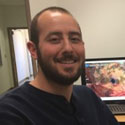
Master’s Student, College of Charleston
Zach Proux is a master’s student in Marine Biology at the College of Charleston. He works under the guidance of Dr. Leslie Sautter, Associate Professor of Geology at College of Charleston, and Dr. Peter Etnoyer, Marine Ecologist in NOAA’s Deep Coral Ecology Laboratory. Zach received his B.S. in Zoology with a concentration in Marine Biology from Michigan State University (2016). During his time at MSU, Zach studied a wide range of topics from sexual selection in gray tree frogs, to virus detection in fresh water fishes. In graduate school, Zach studies multibeam sonar technology and deep coral ecology. His master’s thesis aims to analyze similarities and differences among sessile deep-sea communities on the West Florida Shelf based on their local geomorphology. Zach has been on two research cruises in the past: one aboard NOAA Ship Pisces as a sonar technician for 15 days with the Southeast Fisheries Independent Survey (SEFIS), and one aboard NOAA Ship Nancy Foster as a ROV data analyst and sonar technician for 5 days with the Southeast Deep Coral Initiative (SEDCI). On AT-41, Zach will act as research assistant to Dr. Etnoyer. Zach grew up 10 minutes from Lake Michigan and never imagined he’d be on oceanic research cruises, let alone have an opportunity to explore deep-sea habitats. He is grateful to the many people who helped him get here.
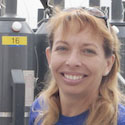
Research Microbiologist, U.S. Geological Survey
Dr. Kellogg is a Research Microbiologist at the U.S. Geological Survey (USGS) at the St. Petersburg Coastal and Marine Science Center in St. Petersburg, Florida, where she leads an environmental microbiology laboratory specializing in coral microbial ecology. She has been working in deep-sea coral ecosystems since 2004 and considers herself extremely lucky to have had the privilege of visiting them personally in the Delta and Johnson-Sea-Link submersibles. She is currently serving as a judge for the $7 million dollar Shell Ocean Discovery XPRIZE competition, the goal of which is to accelerate development of autonomous deep-sea mapping and sensor capacity. Dr. Kellogg holds a Ph.D. in Biological Oceanography from the University of South Florida and a B.S. cum laude in Biology from Georgetown University. When not at sea or in the lab, her interests include stained glass, science fiction, colored gemstones, and the music of ‘80s big hair bands.
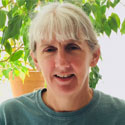
Professor, Harvey Mudd College
Dr. Catherine McFadden is the Vivian and D. Kenneth Baker Professor of Biology at Harvey Mudd College in Claremont, CA. She received a B.S. in Biology from Yale University and a Ph.D. in Zoology from the University of Washington. Her research focuses on the systematics and taxonomy of octocorals, and with current funding from the NSF her research group is developing NGS-based target-enrichment methods to study phylogenetic relationships and skeletal evolution in anthozoan cnidarians (corals and sea anemones). She is particularly interested in understanding species boundaries and the generation of biodiversity in shallow-water soft corals, and in recent years has focused on the coral reef communities of the South China Sea. On this cruise she will be collecting and preserving octocorals, mussels and their associated species for molecular systematic and population genetic studies. This will be her first trip collecting without the use of SCUBA!
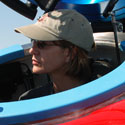
Associate Research Faculty, Florida State University Coastal and Marine Lab
Sandra’s career in the deep sea began with her Ph.D., which was a joint venture between Harbor Branch Oceanographic in Florida, and Southampton Oceanography Center in England. She has since worked on deepwater coral ecosystems in the Aleutian Islands of Alaska, the Norwegian Fjords, the Western Atlantic Margin, and the Gulf of Mexico. She also worked on chemosynthetic ecosystems, most recently the newly discovered methane seeps of the mid-Atlantic Bight. Corals are important components of deep-sea hard-bottom habitats and like their shallow counterparts they are being impacted by various human activities. Sandra’s research focuses on understanding coral distribution, life history strategies, and physiology, particularly how they respond to environmental stressors. She also works with Federal agencies and conservation entities to connect scientific information to the policy and outreach arenas. These efforts have contributed to protection of vast areas of deep coral habitats along the US Atlantic coast. Through the DEEP SEARCH project, she will continue her research on life histories and physiology of deep corals, some of which form reefs and others that colonize rocky habitats, and cold seep fauna. The information generated by the project will continue to protect vulnerable deep sea communities from human activities.
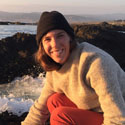
PhD Student, University of California, Santa Cruz
Natasha is a PhD student in the Ocean Sciences department at UC Santa Cruz advised by Dr. Matthew McCarthy (UCSC) and Dr. Nancy Prouty (USGS). She earned her B.S. in Earth Sciences and M.S. in Ocean Sciences at UC Santa Cruz. Her work involves using geochemical and isotopic tools to understand the biogeochemical cycling and environmental change in coastal and deep-sea ecosystems. She focuses on marine bivalves (e.g. mussels, oysters) as indicators for changes at the base of food webs. Specifically, she measures carbon and nitrogen isotopes of whole tissue and specific amino-acids in bivalves as ecological proxies of tracing nutrient flow and estimating trophic level on temporal and spatial scales. The first chapter of her dissertation is researching the role of nitrogen cycling to deep-sea mussels that famously host methanotrophic endosymbiotic bacteria. On this cruise, Natasha will be helping with Dr. Prouty’s research in environmental characterization of deep sea coral habitats. She will collecting water samples from CTD casts for geochemical and nutrient analyses as well as sampling deep sea corals from newly explored sites. In addition, Natasha will also be collecting sediments and mussels from cold seep sites as on-going research in the geochemistry of these methane fueled ecosystems.
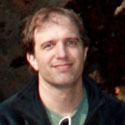
Marine Ecologist, Bureau of Ocean Energy Management
Dr. Michael Rasser is a Marine Ecologist for the Bureau of Ocean Energy Management. He received a B.A. in Environmental Studies from Florida International University (2000), an M.S. (2003) in Forest Resource and Conservation (Minor: Wildlife Ecology) from the University of Florida, and Ph.D. (2009) in Marine Science from the University of Texas at Austin. Mike’s areas of expertise include landscape and community ecology, and the use of geographic information systems (GIS) and remote sensing as tools for environmental monitoring, mapping and analysis. Michael Rasser serves as the national headquarters marine ecologist in the BOEM Environmental Studies Program overseeing the development, planning, and coordination of applied marine ecology studies, including the DEEP SEARCH project.
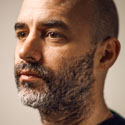
Filmmaker
Ivan Hurzeler makes movies about people fighting the odds. He began his career as a video artist, producing work for galleries and art fairs in New York City and around the world. He ventured into narrative work by directing the short film “Famous Person Talent Agency”, selected for the Sundance Film Festival. From there, he worked in documentary covering a range of subjects from the devastation of Hurricane Sandy, to the Indy 500 for clients such as Con Edison, MOMA Los Angeles and Verizon. Ivan's documentary feature Acid Horizon premiered at the 2018 Santa Barbara International Film Festival, and will be released in the Fall of 2018.
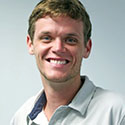
Media, HuffPost
Chris D'Angelo is an environment reporter at HuffPost covering public lands, oceans, endangered species and climate change. A native of St. Louis, Missouri, he escaped the midwest after high school to pursue his passion for writing and explore the mountains and rivers of western Montana. He graduated from the University of Montana in 2009 and spent several years working as a journalist in Hawaii. He now lives in Washington, D.C.